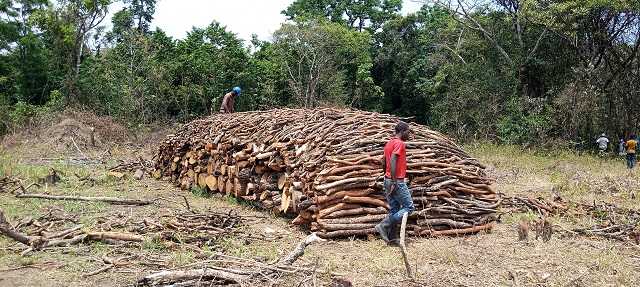
Kampala, Uganda | Isaac Khisa | Uganda’s urban households have relied on charcoal as their source of energy for decades but there has been no deliberate efforts to facilitate sustainable production practices and technologies to conserve forests.
The good news now is that the Food and Agriculture Organisation of the United Nations is rolling out a new project known as forest management and sustainable charcoal value chain in Uganda to mitigate negative environmental, social and economic impacts of charcoal production through promotion of sustainable charcoal production practices, such as establishment of woodlots and use of more efficient charcoal production kilns, while at the same time promoting cleaner energy alternatives.
The project, whose beneficiaries are to be identified soon and assisted with grants, is to be implemented in the Northern, West Nile, Central and Mid-West regions of Uganda, covering Adjumani, Yumbe, Obongi, Moyo, Amuru, Gulu, Kitgum, Lamwo, Nwoya, Kassanda, Kiboga, Luwero, Mubende and Nakaseke districts.
Vallance Turyamureba, the program assistant in charge of plantation development at FAO said the new project is in response to a sudden shift in charcoal production from areas such as Nakasongola as a result of forest depletion to now West Nile districts such as Adjuman and others.
Turyamureeba said the project also seeks to support establishment of dedicated wood energy plantations by communities and small and medium scale private sector actors, rehabilitation of forests on private land, enhance institutional and policy framework to streamline charcoal value chain, and promote clean energy alternatives.
He said the country’s Vision 2040 is to shift progressively from dependence on solid biomass for energy to modern, clean energy alternatives such as solar, electricity and Liquefied Petroleum Gas (LPG), in line with global development goals to achieve universal access to clean energy.
However, due to logistical and technical constraints associated with transition to clean energy alternatives, the shift remains a challenge.
“In the short to medium term, relatively clean biomass fuels, charcoal in particular, if sustainably produced, will play a significant role in meeting energy needs of Uganda’s growing population, during the transition to clean energy alternatives,” Turyamureba said.
He said compared to other forms of biomass energy, charcoal, is considered cleaner, more efficient and with higher energy content per unit of weight. He said whereas the long-term solution is to promote affordable alternative sources of energy, it is equally critical to ensure, in parallel, efficient and sustainable sourcing and production of charcoal.
This development comes as Uganda plans to join the rest of the world to commemorate International Day of Forests on March 21 aimed to create awareness about the importance of all forests.
Charcoal producers open to initiative
Gerald Nyanja, charcoal producer using the traditional method in Adjuman district said he is willing to embrace the new technology provided it eases his work.
“If you are going to bring a better method of charcoal burning, then, I am ready to embrace it,” he said, adding that he is interested in knowing its benefits.
Nyanja said although he would be interested in sustainable tree harvesting for charcoal production, his concern is usually returns.
“We normally agree with the landlord in which every acre of trees is priced at Shs350,000. Now, it is usually upon me to cut all the trees so that I recover the costs incurred and also make a profit,” he said.
Richard Kaijuka, the LCV vice chairperson in Adjumani District said the district leadership is in support with the FAO to help restore the degraded forests.
He said the leaders in the area have attempted to conserve the forests through numerous arrests of the suspects but that that has not been enough to conserve the forests.
Statistics from FAO shows that biomass energy accounts for about 90 percent of the total primary energy consumed through firewood, charcoal and crop residues and that the demand for wood fuel (charcoal & firewood) could increase at a rate of 4.2 percent annually.
The UN agency also reveals that 65 percent of urban households rely on charcoal as their major source of energy yet the unsustainable charcoal production practices and technologies are now the major causes of deforestation and forest degradation. Moreover, Green House Gas (GHG) emissions from the charcoal value chain account for 6.7 percent of national GHG emissions.
“By 2030, emissions from the charcoal value chain may account for up to 35 percent of Uganda’s total GHG emissions if no action is taken to improve the charcoal value chain,” FAO states.
 The Independent Uganda: You get the Truth we Pay the Price
The Independent Uganda: You get the Truth we Pay the Price


